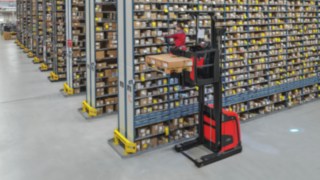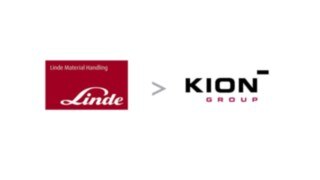
Sustainability management as a programme for the future
3 Feb 2016
Linde Material Handling publishes its first sustainability report
Linde Material Handling, a leading global manufacturer of forklift and warehouse trucks, published its first sustainability report in late 2015 at http://report.linde-mh.com. The report follows the G4 Guidelines of the Global Reporting Initiative (GRI) and is now also available as a printed publication. It describes the impact of Linde Material Handling’s business activities on society and the environment. The sustainability management system, introduced as a pilot project throughout the KION Group in 2015, provided the substantive basis for the publication, along with the associated sustainability strategy. As part of this strategy, Linde Material Handling specified its goals, initial measures and corresponding key performance indicators.
Major objectives of Linde’s sustainability strategy include future-proof, safe and efficient products, efficient manufacturing and a safe and healthy working environment, as Sabine Neuß, Chief Operating Officer, explains: “For us, this means, for example, reducing the energy consumption and exhaust emissions of our industrial trucks or using electric service vehicles wherever this makes sense. We are determined to find more ways to save energy in production. For example, we are equipping our new plant in the Czech Republic with LED lamps right from the start. Similarly, we take into account social and economic aspects. Health and safety of our employees are keywords in this regard.”
Andreas Krinninger, CEO of Linde Material Handling since 01 January 2016, commented on the publication of the report as follows: “Many of our activities as a company affect the lives of people around us, directly or indirectly. Here we must act in a sustainable – that is, in a particularly responsible – way. We can achieve this, for example, by developing reliable, efficient and safe products, services and solutions, by applying ethical principles in our daily activities and by expecting from our suppliers sustainable standards right down to the ramifications of the supply chain.”
Sustainability is a global challenge
Linde Material Handling prioritised its activities based on a listing of twelve global challenges, identifying and assessing the most relevant such activities – those that exert the greatest influence on the company’s business and are of the utmost importance for stakeholders: climate change and resource scarcity, human rights, health and demographic change, diversity, equal opportunity and urbanisation. This has resulted in the following core points for the sustainability program which are also the focus of the sustainability report: sustainability strategy and management, corporate governance, environmental protection, products and solutions, good employer, and community engagement. “Linde Material Handling is already practicing much of what is considered to be sustainable – occupational safety, efficient products, health care, environmental protection. With our product life cycle assessment and management systems for health, safety and environment (HSE), we already have valuable tools in place to steer our activities,” says Dr. Holger Hoppe, Head of Sustainability Management for Linde Material Handling and the KION Group.
On the way to becoming a pioneer
CEO Andreas Krinninger sees the publication of the report and the sustainability strategy as an important contribution to the future viability of the entire group: “For Linde Material Handling, the comprehensive reporting of sustainability data, which will be established in twelve subsidiaries initially and later on in all Linde units, will provide the basis for defining and implementing future priorities, objectives and measures on the way to becoming one of the most sustainable manufacturers of industrial trucks. Along with a corresponding organisational structure, clearly assigned responsibilities and the appropriate reporting infrastructure, we have laid the necessary foundations and these are now being established throughout the KION Group.”
Solid data base and sustainable structures
The contents of the first sustainability report are based on the 2014 business figures, whilst also taking into account relevant topical developments of 2015. They relate to the segment Linde Material Handling. The report was compiled in accordance with the G4 Guidelines of the Global Reporting Initiative (GRI), based on prioritised sustainability issues of a prior materiality analysis. The report takes account of the data of 175 production and sales locations in 13 countries, with a total of 12,144 employees, i.e. around 87 percent of the entire Linde segment.

